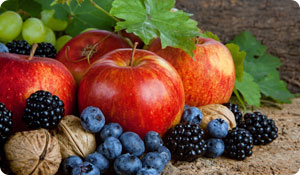
Want to lower your risk for diabetes? Grab a piece of fresh fruit—but steer clear of fruit juice.
Individuals who eat at least two servings a week of whole fruit have a 23 percent lower risk of diabetes when compared with those who get less than one serving a month, according to a study from the Harvard School of Public Health reported in the Huffington Post. The study also found that individuals who consumed one or more servings of juice daily increased their risk of diabetes by up to 21 percent.
"Greater consumption of whole fruits—specifically blueberries, grapes, and apples—is significantly associated with a lower risk of type 2 diabetes, whereas greater consumption of fruit juice is associated with a higher risk," the study authors wrote in the British Medical Journal article.
Diabetes—regardless of the type—means there is too much glucose (sugar) in the blood, which can lead to serious health problems. Type 2, the most common type, can develop at any age and is often preventable.
Here, other good reasons to add more whole fruit to your diet:
- Fruit is rich in fiber, antioxidants, and phytochemicals. These may have beneficial health effects.
- Whole fruit makes you feel full, notes Mark Spielmann, RD, LDN, nutrition manager at La Rabida Children's Hospital in Chicago. "But drinking liquids like fruit juice rarely satisfies your hunger," he explains. "This leads you to ingest more calories to satisfy your growling stomach." When a person is overweight, the risk of diabetes increases.
- Whole fruit has another health benefit over juice, Spielmann says. Besides quelling hunger, it can lower cholesterol. "But fruit juice has no fiber and may have added white sugar, which can raise cholesterol," he says.
- The antioxidants that are found in whole fruit (which may help prevent various forms of cancer) are much lower in fruit juice. "Between the fiber and the antioxidants, all the good stuff gets thrown out when juice is made," Spielmann explains.
- Since whole fruit contains pulp, it doesn't cause such as rapid a rise in the blood sugar as does fruit juice, explains Spyros Mezitis, MD, MPH, of Lenox Hill Hospital in New York City. When there is less of a blood sugar surge, your pancreas doesn't have to produce as much insulin, he says. "The risk is that when your system has to keep pumping out more and more insulin to deal with all the sugar, after awhile the pancreas can peter out and get tired of working," the doctor says. When this happens over time, you're more likely to develop insulin resistance, which can ultimately lead to diabetes.
Is one fruit better for you than another? All fruit is nutritious, but you may want to bump up your consumption of the three fruits that got a shout-out in the British Medical Journal study. The flavonoids that give grapes, apples, and blueberries their color have antioxidant properties worth getting plenty of. Blueberry-apple pie, with some grapes on the side, anyone?
Mark Spielmann, RD, LDN, reviewed this article.
Sources:
Muraki, Isao. "Fruit consumption and risk of type 2 diabetes: Results from three prospective longitudinal cohort studies." British Medical Journal. Web. 29 August 2013.
http://www.bmj.com/content/347/bmj.f5001
Huffington Post. "Eating whole fruits linked to lower diabetes risk." Web. 30 August 2013.
http://www.huffingtonpost.com/2013/08/30/fruit-diabetes-juice-type-2-risk_n_3839169.html





